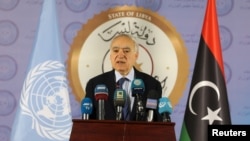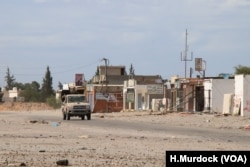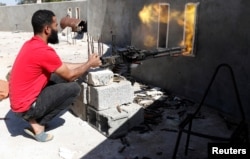The top United Nations diplomat for Libya warned Tuesday that the country is on the verge of descending into a full-scale civil war, as a warlord general from the east continues to try to capture the capital from the internationally-recognized government.
“Libya is on the verge of descending into a civil war, which could lead to the permanent division of the country,” U.N. envoy Ghassan Salame told the U.N. Security Council. “The damage already done will take years to mend, and that’s only if the war is ended now.”
The latest round of fighting began on April 4, when General Khalifa Haftar, who holds sway in the country’s east, moved his fighters on Tripoli, to the west, in a bid to take control of the capital from U.N.-backed chairman of the Presidential Council and Prime Minister Fayez al-Serraj. A U.N. call for a Ramadan truce has failed to materialize.
Salame said the fighting has killed more than 460 people, 29 of them civilians. More than 2,400 people have been injured, most of them civilians. Another 75,000 Tripoli residents have been forcibly displaced. He said humanitarian actors estimate that more than 100,000 civilians remain trapped in frontline areas, with about 400,000 more in areas directly impacted by the clashes.
He accused both sides of violating an international arms embargo imposed on Libya.
“Many countries are providing weapons to all parties in the conflict without exception,” he said. “The amount and sophistication of these weapons are already causing greater numbers of casualties.” He urged robust enforcement of the arms embargo.
Salame said Libyans are resigning themselves to a conflict that could last months or years; but, he said the slide into full civil war or even the partition of Libya is not inevitable.
“A better future is still possible, but we all must be seized with the fierce urgency of now, while the front lines remain on the outskirts of Tripoli and before the battle moves, God forbid, to the capital’s more densely populated neighborhoods.”
Salame said that would require concerted and immediate action by the international community. He appealed to the Security Council to call for a cease-fire and for the warring parties to re-engage with his team to end the fighting and return to the U.N.-led political process.
He painted a bleak picture for what lies ahead if that fails to happen.
“The violence on the outskirts of Tripoli is just the start of a long and bloody war on the southern shores of the Mediterranean, imperiling the security of Libya’s immediate neighbors and the wider Mediterranean region,” the envoy predicted.
He also warned it would create an even bigger opening for terrorists and others who have exploited the instability and lack of a unified government in Libya for the past eight years since dictator Moammar Ghadhafi was ousted.
“The security vacuum created by the withdrawal of many of General Haftar’s troops from the south, coupled with the focus of the western forces on the defense of the capital, is already being exploited by Da’esh and al-Qaida,” he said. By Da'esh, he was referring to the so-called Islamic State group by its Arabic acronym.
He warned that in the country’s south, Islamic State’s black flags are starting to appear and since Haftar’s offensive for Tripoli began on April 4, there have been four IS attacks in that area, killing 17 people. There has also been a spate of kidnappings.
The latest cycle of fighting began on the eve of a national dialogue conference that was meant to bring the country’s diverse groups together to build on progress toward new elections. The dialogue has been indefinitely postponed.






